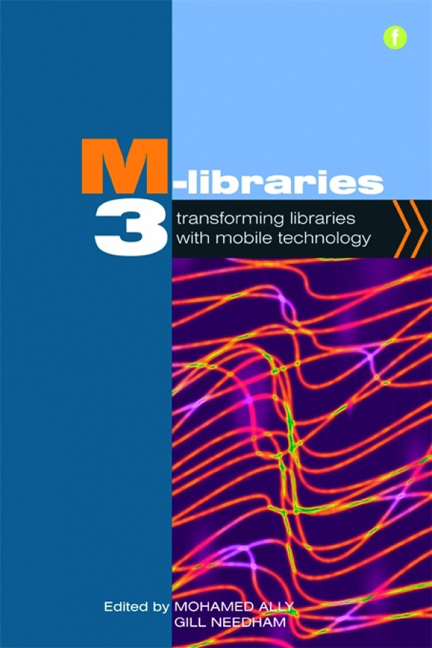Book contents
- Frontmatter
- Contents
- Acknowledgements
- Contributors
- Foreword
- Introduction
- 1 Education for all with mobile technology: the role of libraries
- PART 1 DEVELOPING MOBILE SERVICES
- PART 2 PEOPLE AND SKILLS
- PART 3 FOCUS ON TECHNOLOGY
- 15 Mobile services of the National Library of China
- 16 India's mobile technology infrastructure to support m-services for education and libraries
- 17 Use and user context of mobile computing: a rapid ethnographic study
- 18 Meeting the needs of library users on the mobile web
- 19 Mobile dynamic display systems for library opening hours
- 20 Device-independent and user-tailored delivery of mobile library service content
- 21 Designing effective mobile web presence
- Conclusion
- Index
17 - Use and user context of mobile computing: a rapid ethnographic study
from PART 3 - FOCUS ON TECHNOLOGY
Published online by Cambridge University Press: 08 June 2018
- Frontmatter
- Contents
- Acknowledgements
- Contributors
- Foreword
- Introduction
- 1 Education for all with mobile technology: the role of libraries
- PART 1 DEVELOPING MOBILE SERVICES
- PART 2 PEOPLE AND SKILLS
- PART 3 FOCUS ON TECHNOLOGY
- 15 Mobile services of the National Library of China
- 16 India's mobile technology infrastructure to support m-services for education and libraries
- 17 Use and user context of mobile computing: a rapid ethnographic study
- 18 Meeting the needs of library users on the mobile web
- 19 Mobile dynamic display systems for library opening hours
- 20 Device-independent and user-tailored delivery of mobile library service content
- 21 Designing effective mobile web presence
- Conclusion
- Index
Summary
Introduction
To understand the use and user context of mobile computing, a researcher from the Undergraduate Library at the University of Illinois Urbana- Champaign observed and surveyed students’ use of a library iPad while riding a campus bus. Using a rapid ethnographic approach to focused qualitative data collection, the librarian questioned students about the type of journey and their destination in order to understand aspects of the idea of user context. This chapter discusses the complexities of individual - ized context and the implications for application development. It will give stakeholders in university campuses an understanding of users’ prefer - ences and areas for further development of mobile information access.
Work that focuses on the context of use and on users is absent from the m-libraries research literature. Specifically, design considerations should be informed by an understanding of the attributes of users’ locations and the extent to which users’ changing environments have an impact on information searching with mobile technologies. A recent article on urban computing points out that information access occurs in a specific place, at a specific time and on a specific device (Hansen and Grønbæk, 2010). The authors relate the importance of the mobile user being situated ‘within a physical and digital context, which changes as we move about or engage in different activities’ (Hansen and Grønbæk, 2010, 195). It is theorized that the physical context in which information searching and access take place will have an impact on the ways in which individuals search for information.
Usability testing, as defined by Nielsen, requires small numbers, with five to ten participants being a sufficient sample group for understanding usability concerns (1993, 169). The rapid ethnographic approach is a type of usability study. The information sought in this study was about use of the iPad in the field, and a probing approach was taken in order to gather the data quickly (Millen, 2000). Millen defines rapid ethnography as ‘a collection of field methods intended to provide a reasonable understanding of users and their activities given significant time pressures and limited time in the field’ (Millen, 2000, 280).
Methodology
Ten participants, all undergraduate students riding the bus, were recruited for this study, which took place during three days at the end of November and beginning of December. The rapid ethnographic approach does not necessarily produce a representative sample (Millen, 2000, 281).
- Type
- Chapter
- Information
- M-Libraries 3Transforming libraries with mobile technology, pp. 151 - 158Publisher: FacetPrint publication year: 2012
- 2
- Cited by



